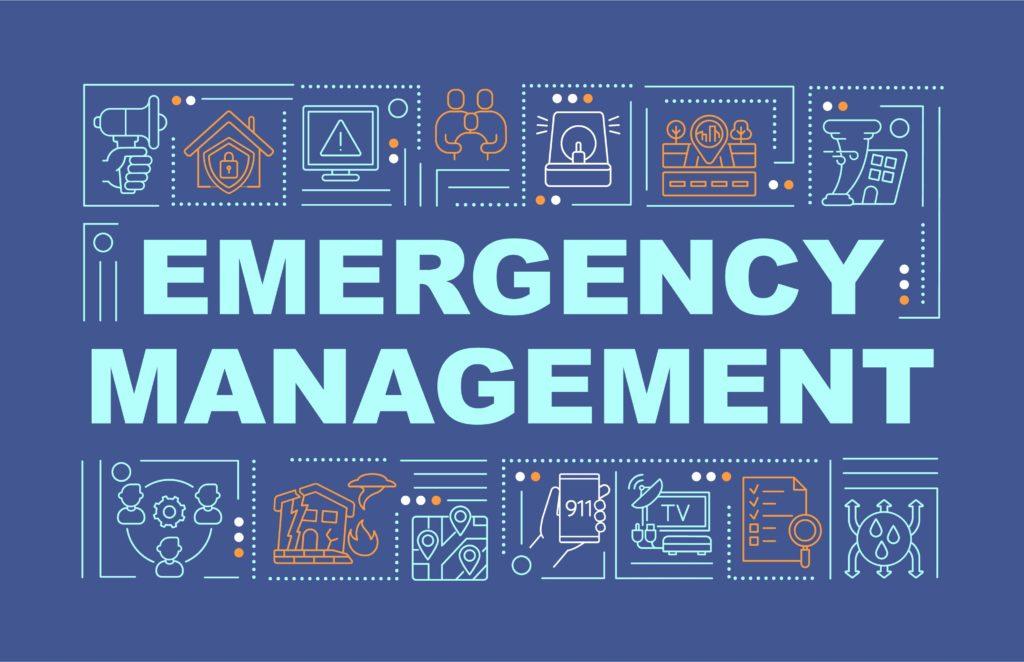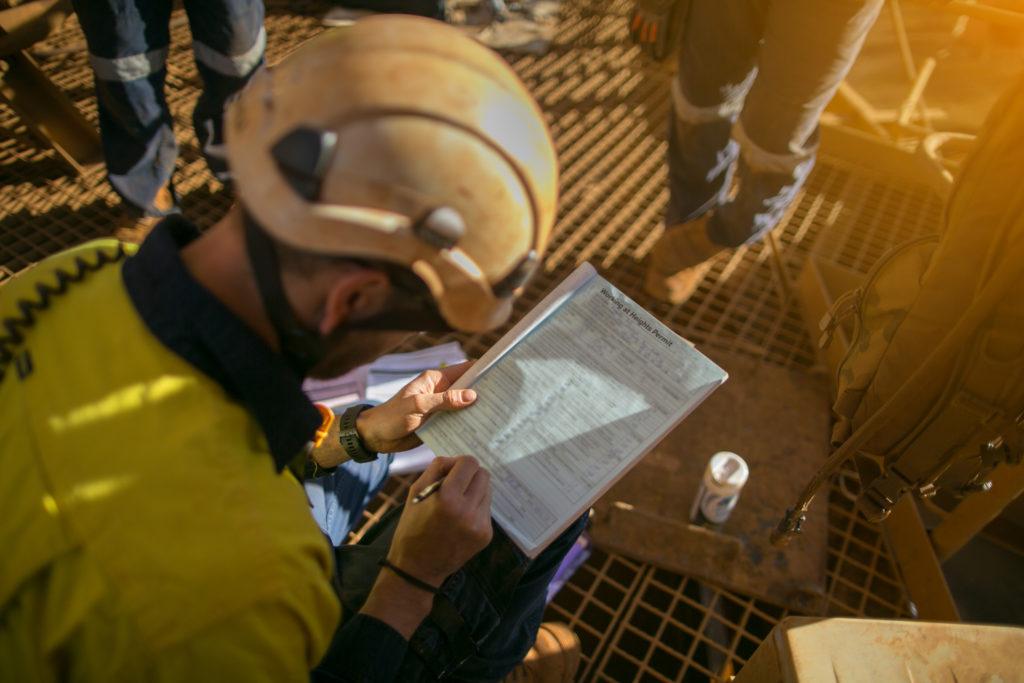
Emergency Management Degree Guide discusses certificates, associate degrees, bachelor’s degrees, master’s degrees, and PhDs in this field. The role of an emergency disaster management professional is to protect citizens during a variety of different types of emergencies and disasters. According to the United States Bureau of Labor Statistics, jobs in the field of emergency management leadership are expected to grow by eight percent between the years 2016 and 2026.
Most people already working in the field of emergency management report that they have a high level of job satisfaction. Earning a master’s degree in emergency management online can assist students with beginning their careers in this growing field or advancing in their current careers.
By obtaining a master’s degree in emergency management online, students have plenty of flexibility to continue working while meeting the criteria for their degrees. This also helps students who are raising a family and need to complete their coursework around their other responsibilities. Students can possibly finish their degree in a shorter amount of time than traditional students since they can work at their own pace. Students can work night or day on their coursework, so many can complete their degrees ahead of time.

What Do Online Master’s In Emergency Management Curriculum And Courses Look Like?
Online master’s degree programs in emergency management focus on a particular area of the field. For many students, that is the management area of emergency management. Students learn the skills they will need to properly plan, prepare, and respond to any threat. These threats include natural disasters, such as tornadoes and hurricanes, security threats, toxic spills, and organizational crises.
As part of most curriculums in a master’s in emergency management program, students will learn:
- Principles of Emergency Management: This will help students to be able to prevent disasters from occurring that are preventable. They will also learn to prepare for and mitigate disasters that do occur. They will learn about the main components of Emergency Management. Those include prevention, protection, mitigation, response, and recovery.
- Applied Emergency Management: Students can distinguish between the different types of crises. They will also learn how to develop a proper response using Emergency Management planning and preparedness strategies.
- Disaster Response and Recovery: students will learn how to analyze critical incidents that happen in the real world properly.
- Emergency Planning and Preparedness: students will study the different planning strategies already in place. Or mitigate. These strategies are used to prevent the consequences of a disaster and how it affects communities.
Careers And Their Salaries With An Online Master’s In Emergency Management
With a master’s degree in emergency management, graduates can secure positions in various fields. Those areas include education, health care, private business, and government. According to the United States Bureau of Labor Statistics, it is projected that the job growth rate in the field of Emergency Management will be eight percent over the next decade. This equals more than 800,000 new jobs by the year 2031. It is believed that creating new businesses and expanding businesses already in existence will help foster this job growth.
Job duties that graduate with a master’s degree in Emergency Management will be prepared to conduct include preparing for disasters before they occur or mitigating the damage from a disaster after it occurs. Listed below are various positions that graduate with a master’s degree in Emergency Management can obtain, along with the salaries that accompany each job.
- Public Safety Director with a median income of $54,390 annually.
- Emergency Management Director can make around $76,730 per year.
- A business Continuity Planner can garner an annual salary of about $74,670.
- Occupational Health and Safety specialists pay around $78,740 annually.
- Environmental Protection Officers can earn an income of around $67,119 per year.
Certifications And Licenses For Master’s In Emergency Management
Students working towards their master’s degree in Emergency Management can also earn certifications and licenses for certain areas within the field. Many colleges and universities offer a variety of certificate programs that students can utilize to earn their certificates in various areas. There are many agencies and organizations that also offer certification programs for students with a master’s degree in Emergency Management. For instance, the Federal Emergency Management Agency (FEMA) Certification Program offers certifications in several areas under two different levels of certification, including:
- FEMA Professional Development Series (PDS) Certificate
- FEMA Advanced Professional Series (APS) certificate
- FEMA Professional Development Series (PDS) Certificate
According to FEMA, the Professional Development Series certificate has been around for more than two decades to help train professionals in the fundamentals of emergency management. This can include self-study through online classes and materials or traditional classroom study. Several classes within the Professional Development Series Certificate program include an introduction to exercise, decision-making and problem-solving, effective communication, and more.
Students can also earn certificates from the International Association of Emergency Managers (IAEM) Certification program. These include two professional designations for professionals in the field of emergency management:
- Certified Emergency Manager (CEM)
- Associate Emergency Manager (AEM)

Admissions For Online Master’s Degree In Emergency Management
To enroll in an online master’s degree program in Emergency Management, students must first complete an application at the college or university of their choice. They must submit their undergraduate transcripts, typically with their application, or complete a form so that the college or university can obtain them independently. Students enrolling in a master’s degree program in Emergency Management must already hold a bachelor’s degree in emergency management or a related study area. Remember that all colleges and universities have different criteria for people applying for master’s degree programs. According to the United States Bureau of Labor Statistics, it is typical for colleges and universities to require students entering into a master’s degree program to hold a bachelor’s degree already.
Master’s degree in emergency management applicants may also have to take the GRE (Graduate Record Examination) exam or the GMAT (Graduate Management Admission Test) before they can be accepted into the program. These tests are created to determine if a student has the necessary skills and knowledge to succeed in a master’s degree program. Some colleges and universities may waive these tests for students with relevant work experience or training. Students may also be required to take an admissions exam at the college or write an essay about their reasons for wanting to obtain a master’s degree in Emergency Management or a related field. Students need to check with the university or college they apply to so they can find out all of the requirements of that particular school.
College Accreditation (Is Accreditation Important?)
It is essential that students check out potential colleges and universities that they want to attend ahead of time to ensure that they are accredited. College accreditation is important for many reasons. One of those is financial aid availability. Colleges and universities must be accredited to allow students to apply for grant programs and even various student loan programs. This is imperative for students who need help when it comes to financing their degrees.
It is also essential that a college or university be accredited so that students can transfer their credits from that institution to another one where they are furthering their education. This is because the transfer of credits will most likely depend on a school’s accreditation status and the type of accreditation that each school has in place. Accreditation also ensures that a college or university is up to par regarding academic quality. This is because the governing agencies that offer college accreditation evaluate each school to ensure they are providing quality education to students.
A college or university that has obtained accreditation status means that the school has shown proof of positive outcomes for students. This can include knowledge retention, how many students are able to graduate from their programs, and how many graduates are then able to obtain employment after graduation. Some industry certifications, professional designations, and licensures will specifically require that students have a degree from an accredited college or university.
Most colleges and universities are accredited through regional organizations, while trade schools and certain other institutions obtain their accreditation through national organizations. Regional accreditation is the best type to have in place for colleges and universities.
Financing Your Master’s Program Thru Financial Aid
Graduate school can be expensive, so students need a funding plan to help them with the cost. Remember that the costs of obtaining a master’s degree in emergency management will vary from college to university. When it comes to financing a master’s degree program in emergency management, students should apply for free aid first before applying for loans that they will have to pay back in the future. Listed below are several options when it comes to financial aid for graduate students:
The FAFSA: All students should complete the Free Application for Federal Student Aid (FAFSA). It provides access to all federal, state, and some school-based grants. Students eligible for grants will be notified of which grants they qualify for. They can apply for those on an individual basis if needed. Sometimes the FAFSA application will be enough to determine their eligibility for most grant programs.
Organization Grants: These grants are industry specific, and several may be available for students in the area of Emergency Management.

Financing Your Master’s Program Thru Scholarships
Scholarships: There is an array of different scholarship programs available through various sources. Students should check with their state and local government agencies to see what scholarships are available in their area. Students can also check with their schools or even private organizations that may provide scholarships, such as academic excellence or increased diversity.
Fellowships: Many colleges and universities offer fellowship programs to graduate students. This is based on their field of study and academic performance. They can exchange college courses for work opportunities, research, and other areas.
Assistantships: Many schools and universities will pay students tuition waivers and even stipends for living expenses for full-time students willing to work in exchange for these costs to be covered. Employer tuition assistance: Students already working can check with their employers if they offer tuition reimbursement programs.
What Is Emergency Management?
Emergency Management is coordinating and managing various resources and responsibilities that come into play during an emergency. Graduates in Emergency Management must have the knowledge and skills to coordinate resources to mitigate any emergency. They must also be able to implement procedures to prepare resources for an emergency and to be able to respond to and recover from an emergency properly.
Students must learn how to gather, manage, and analyze a large amount of data to implement each phase of the Emergency Management cycle. Those phases include mitigation, preparedness, response, and recovery. The main goal of an Emergency Management plan is to be able to provide what is necessary to help communities recognize and be able to decrease vulnerabilities in certain disastrous situations. Any emergency manager must have the skills to help communities cope with the aftermath of a disaster and to implement and develop disaster response plans. The plans created need to be comprehensive, risk-driven, progressive, integrated, flexible, coordinated, collaborative, and professional.

Do I Need To Take The GRE To Enroll In An Online Masters In Emergency Management?
Many master’s of emergency management degree programs require prospective students to have a bachelor’s degree before applying to a master’s degree program. Some schools and universities require students to submit GRE and GMAT scores before being considered for admittance into a master’s degree program.
The Graduate Record Examination, often called GRE, is an examination that colleges and universities may require. The GRE (Graduate Record Examination) exam or the GMAT (Graduate Management Admission Test) are multiple-choice, computer-based tests that cover several different areas, such as mathematics and English, the students must complete before being accepted into a specific master’s degree program. Both the GRE and the GMAT tests are utilized to determine if each student that applies to a master’s degree program has the necessary skills and knowledge in place to be able to succeed in the program. Some colleges and universities will waive these examinations for students who have comparable training or work experience.
Is An Online Master’s In Emergency Management Difficult?
Most master’s degree programs in general can be difficult. The programs are intense and concentrated in certain areas of Emergency Management or other fields of study. It is important for students to have a strong interest in Emergency Management before enrolling in a master’s degree program in this specific area of study. Most colleges and universities will require that students already have a bachelor’s degree in place before they can even apply to a master’s degree program. This includes a master’s degree in emergency management programs. It is helpful if students have already worked in the field of emergency management or if their bachelor’s degree is in a related area of study.
Students should strive to maintain a good work and life balance to help them get through their master’s degree and Emergency Management program. Online master’s degree programs allow students to work at their own pace and still be able to handle their many other responsibilities. These other responsibilities can include childcare, elder care, and a full-time job. It is important that students are able to set aside time to focus on their coursework throughout the length of their master’s degree in Emergency Management program.
Is It OK To Get A Master’s Degree Online?
In today’s world of technology, earning a master’s degree fully online is perfectly acceptable when graduates enter the workforce. Online master’s degree programs can help students propel their careers to the next level. An online master’s degree provides the same amount of advanced knowledge and skills that are provided in a traditional classroom setting. It is important that students ensure that the online master’s degree in Emergency Management program they enroll in is at an accredited university or college. Accreditation is important for a variety of reasons, but one of the number one reasons is so that they can transfer their credits if they want to continue on to earn a doctorate degree in the field of emergency management.
Most of the top-ranked universities and colleges in the United States now offer online master’s degree programs. This allows students with a busy schedule to be able to juggle a full or part-time job, family responsibilities, and other responsibilities due to the flexibility provided by an online degree program.
Employers respect online master’s degrees. Students can work at their own pace and can even finish their master’s degree programs sooner than expected in many cases.

How Long Does It Take To Get An Online Master’s In Emergency Management?
The length it takes for students to earn an online master’s degree in emergency management can vary from university to university or college to college. Most master’s degree programs will take students around two years to complete. The fun fact about earning a degree fully online is that students can complete their master’s degree programs in a shorter amount of time. Many students can earn their master’s degree in emergency management in 18 months or less.
There are many online programs in which students can earn their master’s degree in emergency management in less than one year. This is a great bonus for students who are already working in the field or who work full or part-time jobs in a related field.
Is Emergency Management A Difficult Career?
A career in Emergency Management is very exciting and rewarding. Students will work to prepare citizens for natural disasters and other emergency situations while also creating plans for preparedness and recovery. Graduates will work with local, state, or national governments or agencies to help with disaster relief in certain areas of the United States or even worldwide. Graduates can also opt to work in the private sector carrying out the same types of duties.
It is important to note that there can be high-stress levels that come with a job in the emergency management field. This is due to the fact that navigating a way through a disaster is stressful in general. Emergency managers must be on the ground to help citizens with evacuations and to obtain food, water, and shelter. Managers will have to give press briefings and work with a variety of different government officials when dealing with an emergency situation.
Emergency managers are on call basically at all times, since one never knows when a disaster will strike. For example, if a plane crash occurs, an emergency manager must spring into action to help deal with the situation. This can mean several sleepless nights in a row and working with a variety of different people and agencies to recover from the disaster.
What Is The Job Outlook For A Graduate With A Master’s Degree In Emergency Management?
The job outlook is a pretty good one for graduates with a master’s degree in emergency management. According to the United States Bureau of Labor Statistics, the job growth rate for Emergency Management through the year 2026 is eight percent. For the employment of Emergency Management directors, there is a projective job growth rate of three percent from 2021 to 2031. This means there will be an average of about 900 job openings for Emergency Management directors each year over the next decade. These jobs will be available due to people retiring from their positions or to replace people who have opted to make a move to a different occupation.
As of May of 2021, the median annual wage for emergency management directors was around $76,730.
What Is The Future Of Emergency Management?
In today’s world of Emergency Management, the Internet is more important than ever before. For example, emergency managers now have the ability to utilize information generated by citizens to be able to inform and guide their approaches to a variety of different crises. Another example is an emergency response team is able to read tweets or other social media postings by citizens to determine the areas in which a disaster most impacts people. When major flooding in a city happens, an emergency management leader can read social media postings. This information will help guide the emergency manager about which location to start during recovery and rescue efforts.
Emergency management is a growing and necessary field that has to be in place to protect citizens throughout the United States and the world.
1. University of Southern California

The Master of Science in Emergency Management program at the University of Southern California is designed to prepare students to take on and become successful in emergency management leadership roles. Graduates will be able to obtain leadership roles within organizations that are in the private or public sectors. Students will take a variety of courses throughout this program. Some of those include critical infrastructure, operational coordination, and disaster planning. Graduates will be able to obtain jobs in the Emergency Management field that will require them to develop strategic plans to mitigate crises or disasters after they occur and to prevent them before they occur. Students develop the tactical decision-making skills needed in this type of position.
2. Arizona State University

The Online Master of Arts in Emergency Management and Homeland Security degree at Arizona State University is created to prepare professionals to be able to become effective leaders in the fields of Homeland Security and Emergency Management. There are many complicated risk and resilience challenges in both areas, including anything from cyber security issues to toxic hazards.
This degree program offers five different concentrations students can choose from to fit their professional development goals. The program will help students advance in their current careers or be able to embark on a new one.
3. Southern New Hampshire University

The online Master of Science in Management (MSM) with a concentration in Emergency Management at Southern New Hampshire University is designed to prepare students to minimize risk and help safeguard the public during various disasters and crises. Students will learn the management skills they need to be able to plan, prepare, and respond to any critical threats. These can include organizational crises, hazardous spills, natural disasters, and security threats to life or business.
4. Ohio University

Ohio University offers an Online Master of Public Administration program in which students can focus their concentration in Crisis and Emergency Management. The program combines academic knowledge with practical skills and strategies so that graduates will be able to handle a variety of different situations they may face while working in emergency situations. Experienced faculty members are available to assist the students in obtaining the knowledge they need to have pivotal roles in the preparation of high-profile emergency events and to implement strategies to mitigate the damage caused. Graduates will be able to work for federal agencies, community organizations, or state and local governments.
5. Georgetown University

The Online Master of Professional Studies in Emergency and Disaster Management program at Georgetown University will prepare students to be able to investigate then manage and analyze emergencies in hazardous situations. They will be able to apply their knowledge to understand how these situations can affect environmental, economic, political, and social systems. Graduates will have a much greater understanding of Emergency Management practices not only in the United States but around the world. Students will be able to examine case studies and real-life examples of multidisciplinary responses to a variety of different emergency situations.
Related:
